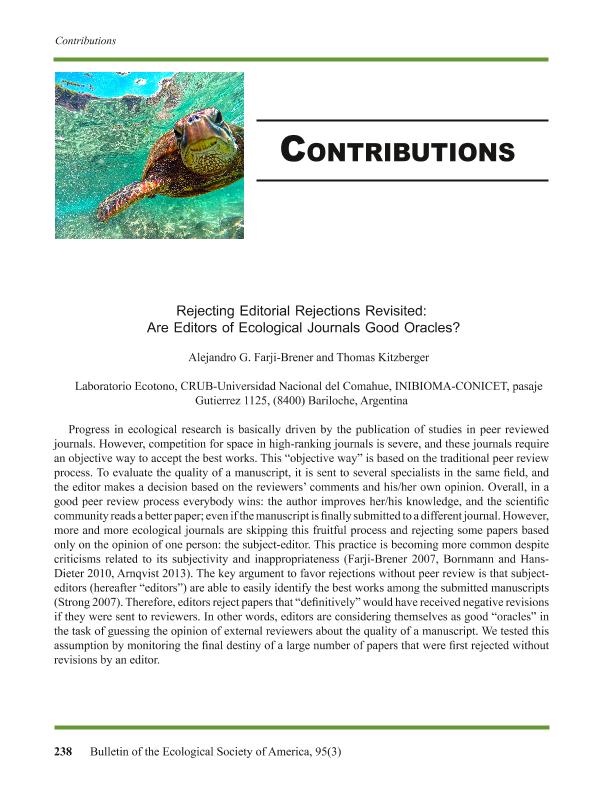Artículo
Rejecting Editorial Rejections Revisited: Are Editors of Ecological Journals Good Oracles?
Fecha de publicación:
07/2014
Editorial:
Wiley
Revista:
Bulletin Ecological Society Of America
ISSN:
0012-9623
Idioma:
Inglés
Tipo de recurso:
Artículo publicado
Clasificación temática:
Resumen
Progress in ecological research is basically driven by the publication of studies in peer reviewed journals. However, competition for space in high-ranking journals is severe, and these journals require an objective way to accept the best works. This “objective way” is based on the traditional peer review process. To evaluate the quality of a manuscript, it is sent to several specialists in the same field, and the editor makes a decision based on the reviewers' comments and his/her own opinion. Overall, in a good peer review process everybody wins: the author improves her/his knowledge, and the scientific community reads a better paper; even if the manuscript is finally submitted to a different journal. However, more and more ecological journals are skipping this fruitful process and rejecting some papers based only on the opinion of one person: the subject-editor. This practice is becoming more common despite criticisms related to its subjectivity and inappropriateness (Farji-Brener 2007, Bornmann and Hans-Dieter 2010, Arnqvist 2013). The key argument to favor rejections without peer review is that subject-editors (hereafter “editors”) are able to easily identify the best works among the submitted manuscripts (Strong 2007). Therefore, editors reject papers that “definitively” would have received negative revisions if they were sent to reviewers. In other words, editors are considering themselves as good “oracles” in the task of guessing the opinion of external reviewers about the quality of a manuscript. We tested this assumption by monitoring the final destiny of a large number of papers that were first rejected without revisions by an editor.
Palabras clave:
Academic
,
Peer Review
Archivos asociados
Licencia
Identificadores
Colecciones
Articulos(INIBIOMA)
Articulos de INST. DE INVEST.EN BIODIVERSIDAD Y MEDIOAMBIENTE
Articulos de INST. DE INVEST.EN BIODIVERSIDAD Y MEDIOAMBIENTE
Citación
Farji Brener, Alejandro Gustavo; Kitzberger, Thomas; Rejecting Editorial Rejections Revisited: Are Editors of Ecological Journals Good Oracles?; Wiley; Bulletin Ecological Society Of America; 65; 3; 7-2014; 238–242
Compartir
Altmétricas




